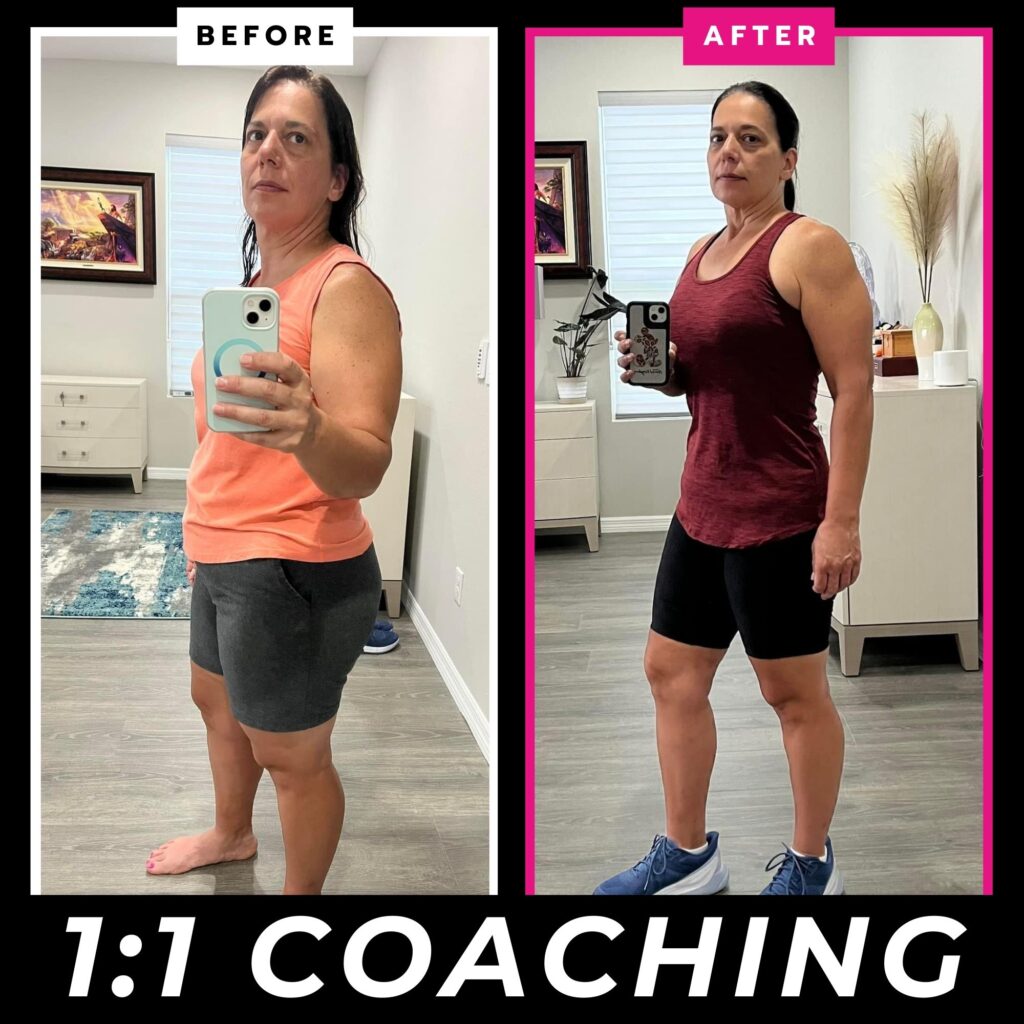I know you’re hoping I’m going to tell you that you can stop tracking your food, but I’m sorry…if you want the best results?
You need to accurately know what you’re consume.
And most of us are really bad at estimating portion sizes and accurately remembering what we’ve eaten. Especially when we are first making a lifestyle change.
What is measured, can be managed.
If you don’t have data, you don’t know what to adjust.
It can make you feel like nothing is working without knowing exactly what to adjust.
When you track, you can make small changes based on what you’re ACTUALLY doing instead of guessing and feeling like you’re throwing spaghetti at a wall hoping something sticks.
However, I do think that a focus solely on calories in vs calories out when we track doesn’t yield the best results nor does it teach us to properly fuel our bodies for long term success.
Trust me…I’ve been down the calorie counting road.
It left me always feeling like I was starving and constantly trying to cut calories lower when my weight loss results stalled.
It led to me constantly yo-yo dieting because I didn’t truly understand the breakdown of my food and how to create a balance and a true change.
I’d create the deficit, lose weight, then increase my calories and regain what I’d lost.
And even when I lost weight, I never achieve the body recomposition results I wanted. I’d get skinny but never look leaner.
So if you want to feel fueled while also achieving amazing body recomposition results what should you be doing instead?
You should be tracking MACROS.
Now I know you’re probably thinking, “Hold up…Isn’t that the same thing as tracking calories?”
And while yes, by dialing in your macros, you will also impact your calorie intake, it honestly isn’t the same thing at all.
Purely counting calories puts the emphasis simply on calories in vs calories out over the QUALITY of those calories.
And the learning process to actually looking at the breakdown of your food is what yields LASTING results.
It’s amazing how much the amount of proteins, carbs and fats you consume can dramatically impact how fueled you feel and the results you get FROM THE SAME CALORIE INTAKE.
And it’s because we’ve also all fallen victim to the “calories are created equal” line.
While this line is a complete oversimplification of things and I know someone’s now going to say, “Calories actually are all created equal because they are a unit of measurement so one calorie equals one calorie…
The point of that statement is that purely counting calories isn’t taking into account the impact each macro, and even our food quality overall, can have on the results we get.
And that by changing the macros of those 100 calories, we can dramatically change how we feel and our long-term adherence.
The types of foods, and macros we consume impact how full we feel, but they can also impact our performance, recovery and overall hormonal balance.
Increasing your protein intake can increase satiety and help you feel fuller between meals.
And whether you’re plant based or an omnivore, increasing your protein is a key place to start.
Not only can it help keep you feeling fuller, but by increasing your protein you can help yourself build and retain lean muscle even while losing fat.
So if you’ve ever been told you can’t lose fat as you build muscle?
That’s just not the case. It’s just a process that requires us to be patient and track…something we don’t like to do.
And while I know carbs are often demonized in our current dieting world where Keto is all the rage, simply cutting carbs for some may not only hold them back from achieving the aesthetic results they want, as carbs can create an anabolic environment ideal for muscle growth, but also negatively impact their performance.
If you’re trying to train for an endurance sport while also trying to lose fat, you want to be conscious of the macros you’re consuming to make sure to get adequate protein to protect your lean muscle mass, as endurance training can be catabolic to muscle tissue, while also getting enough carbs for that instant fuel to perform.
Simply treating a calorie as a calorie could be why you always feel like you’re starving when training while also not losing any weight!
And simply treating all calories as if they are equal also ignores the differing thermic impact of not only each macro but also of processed vs unprocessed calories.
Each macro requires a different amount of energy to be digested and utilized, which isn’t taken into account when we just focus on calories in vs calories out.
Studies have shown protein actually has a thermogenic effect 5 times greater than carbs or fat!
Protein takes the most energy to digest with about 20-30% of the total calories in protein eaten going to digesting it. Then carbs take about 5-10% while fats take 0-3%.
That’s why you can feel so different on the same calorie intake based on the macros you’re consuming!
And then even how you dial in those macros can make a difference.
I know we all see those crazy food concoctions with hashtags about “if it fits your macros” and I’m a big believer in finding balance and working in those foods I love that I know aren’t as healthy for me because it helps me create a sustainable lifestyle balance right for me…
BUT when you track macros, while nothing is off limits, you’ll also find that often your food quality improves.
Not only are you able to include a diversity of foods to get vitamins and minerals from a variety of sources instead of following a restrictive list that can often come with a focus on “clean eating,” but you really aren’t able to just eat crap and hit your ratios.
While those posts may show crazy foods people work in, what you aren’t seeing is that lean protein and veggie meal they’re also eating to make it work.
And that balance not only allows for long-term adherence but can help you slowly focus more and more on whole natural foods even if your diet isn’t as focused on them currently.
By including more whole natural foods in your diet, you’ll consume more nutrient dense foods which will not only benefit you health wise, but also make you feel fuller.
Processed foods because of the caloric density easily lead to overeating. Not to mention because they are hyperpatable you tend to just want…well…more of them even when you ARE full.
Not to mention, processed foods have a lower thermic effect.
A study which actually just used two basic cheese sandwiches, showed that by simply even using a more natural cheese and whole grain bread made a difference in the thermic effect.
So even if these sandwiches both have the same technical calorie intake, because one has a higher thermic effect, your ultimate energy balance will be different.
SUMMARY:
This is why we can’t just focus on calories in vs calories out but instead need to track our macros!
You may be surprised by how changing up your macros, without even adjusting your calories to start, can get you moving forward to feeling fueled while achieving the lean, strong body you’ve always wanted.
And by taking the time to truly learn about the make up of your foods, you’ll be able to adjust over time as your needs and goals change.
Because maintaining your results can’t mean just going back to what you were doing before!
Learn More…




What type of macro/food tracker do you recommend?
I use My Fitness Pal (free version) with my Macro Hacks program – https://macrohacks.redefiningstrength.com/optin-416066421596387411652?sl=blogcomment
What do you think about the “carnivore diet”? Seems like some people love it & are finding it really helpful. I would be bored to death lol.
Thank you for another fabulous blog post!
I personally never find restricting whole food groups to work out well, but I work with clients no matter their dietary preference to dial in their macros to achieve results.
Good for you! There’s a great little book available called “How You’re Meant to Eat” which talks about the importance of balance. Very needed in our world today. So refreshing to find people in fitness who are balanced! Blessings!
Cory I love your posts. You are an incredible human!
Will counting macros balance ny horemones? I have 15 lbs to loose that I gained in 2 months. I used to weigh 248 git down to 125 now I’m at 140. I’m in a panic. I’m afraid ill keep gaining. I do intermittent fasting and eat 2 meals a day
Thanks Amanda!
Tracking can help you really understand what changes you need so you’re not just forcing restriction or doing more. Data can help us really make tweaks without having to stress over what is or isn’t working. And with tracking you can adjust your calories and macros to address your health or hormone needs!
Thank you so much for another great informative and inspiring post!
Glad it helps Bobby!
Love your posts. I use my fitness pal to track macros. I weigh 155, trying to get down to 140. How many calories should I eat and what balance of protein, carbs and fat would you recommend?
Thanks! Glad they help! So you won’t do “one thing” forever. You will cycle ratios and even adjust calories as you move through your journey. Here’s more on the phases of fat loss – https://redefiningstrength.com/the-3-phases-of-fat-loss-and-how-to-do-it-right?sl=blogcomment